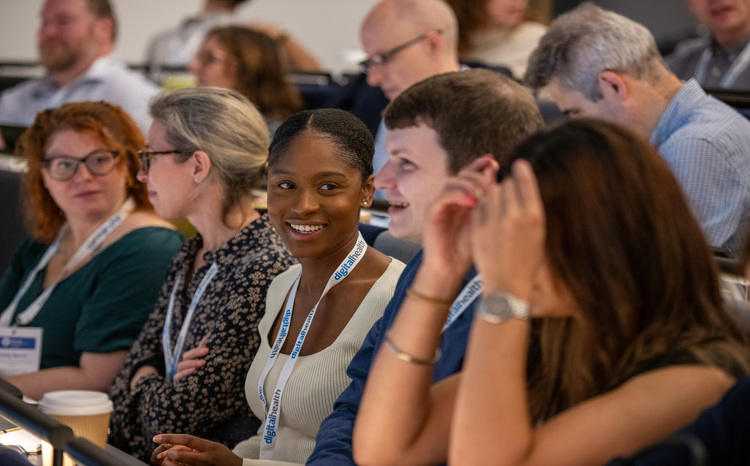From M&S oven chips to NHS microchips – a personal reflection
- 29 October 2019

From working in a Marks and Spencer store in Harrogate right up winning CIO of the Year at the Digital Health Awards 2019, Mandy Griffin, looks back at her career and what lead her to NHS informatics.
What better way to celebrate 10 years working in the NHS than to be awarded CIO of the year 2019! Who would have thought the day I walked into The Health Informatic Service (THIS) porta cabin on 19 January 2009 that was even possible.
I actually had no idea what I had come to do other than to “make a difference”, I knew little of NHS IT or what part in played in healthcare, what a journey it’s been.
I have to confess that at times I do feel like a bit of an imposter, I often reflect on my journey and wonder how on earth did this happen?
Shelf filler to store manager
Maybe it’s a combination of things, looking back I firmly believe that my career in M&S equipped me with the tools to make the transition and in retrospect I did actually have quite an unusual career in M&S going from “shelf filler to store manager”.
Being appointed to the Harrogate store in 2007 was the icing on the cake for me, Harrogate was one of the prize jobs in Yorkshire so I was honoured to be asked to go there and manage.
Good strong leadership is essential, understanding the logistics and operation of your store is important, I didn’t realise at the time and probably took it for granted but I did use real time data every day to make decisions around sales, staffing and product.
I could forecast how many tills I would need and how many fitting rooms we should open, I knew to the minute how much I had sold that day by product, by department. I even knew how many people had walked through the door, what my conversion rate was and what the average basket price was at any point of the day or week.
The point of sale tills became the route from which stock was replenished and delivery vehicles were scheduled, I had systems that actually spoke to each other.
Customer is always right
“If in doubt the customer is always right” was always a bit of a strap line at M&S, offering to help or guiding your customer to the part of the store they needed to be in and actively going out of your way to give the best service you could possibly give was the behaviour one would promote as well as ensuring the shop was clean tidy and well stocked. Does any of this sound familiar?
So when I joined the NHS, my shop became THIS where I now served as the chief operating officer, my customer became the hospital, GP Practice or a CCG where giving the best service I could give was allowing our customers to give the best care possible to their patients
Joining the NHS was a massive change but an easy decision – it did feel like it was the right thing to do. I have many opportunities to grow and as a leader, I have a great team and really do see THIS as my extended family even though there are 200 plus members.
When I look back at what has been achieved, I really couldn’t have done it without them. We support over 30, 000 users across West Yorkshire and beyond meaning we are the largest NHS IT shared service organisations in England.
We have developed and supported some great products over the years with one our most successful being NPex, a lab to lab messaging solution developed through a longstanding partnership with Xlab limited, a Leeds based university spin off company.
Delivering the digital strategy
THIS is hosted by Calderdale and Huddersfield NHS Foundation Trust, so leading on the delivery of a digital strategy became part of my role when I was appointed as the interim director of informatics in 2015.
Delivering the strategy has meant the Trust is now one of the most digitally mature hospitals in the NHS. The strategy is very much underpinned by the Cerner Millennium EPR which in partnership with Bradford Teaching Hospital Foundation Trust, went live in 2017. At the time Cerner described this as the biggest Cerner deployment in Europe.
I am not a technical CIO and never intended or felt the need to be. I have specialist expertise in bucket loads – why would I compete, even if I could.
Going back to school
I am a generalist and always have been. Being a successful CIO is about leadership, the ability to fit in, being able to focus externally rather than internally and it’s about influence rather than control.
However, five years ago I did accept that if I was going to prosper in this business then I needed to know something about it, which is why I decided to study for a Masters Degree in Health Informatics.
It helped me accelerate my learning over the three-year study period. I have been able to put my new-found knowledge to good practice within my job role and I believe it ultimately played a part in me being appointed to the interim director role for CHFT in 2015. This is now my substantive role but with the grand title of managing director of digital health.
Time for reflection
So, as I approach my 11th year and the shell shock has finally worn off, I can reflect on some of the highlights, lessons and main points of learning.
I have spent a lot of time over the last ten years listening, which wasn’t really part of my key skill set as an M&S Store Manager.
I am still regarded by my colleagues, peers and customers as chatty, enthusiastic, energetic, tenacious and approachable. But I firmly believe that my biggest asset is my ability to listen, appreciate, understand and act.
I love my job, it’s an absolute privilege and a pleasure to do what I do. That said, some things don’t really change that much.
As an M&S Store Manager I was 100% focused on creating an environment where the sales advisors, sales assistants and staff supervisors could provide outstanding customer service.
As an award-winning CIO, I do exactly the same but today my customers are citizens, patients, nurses, doctors, managers and executive directors. Managing the culture for me will always be king.



